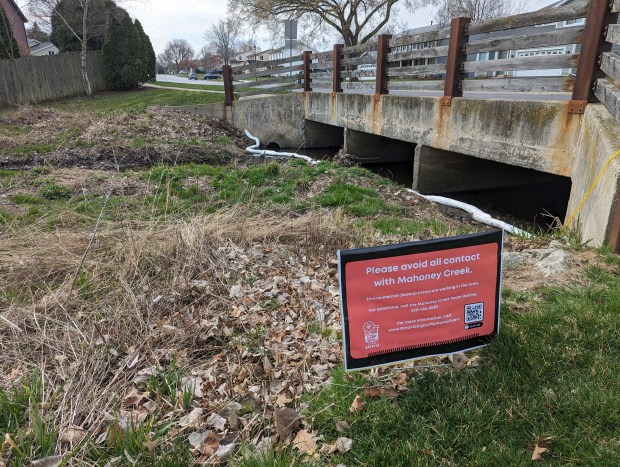The recent chemical foam spill in Batavia did not have any impact on the quality of drinking water in Aurora, officials said.
On March 8, a malfunctioning fire suppression system at an industrial building in Batavia sprayed firefighting foam into a stormwater basin, which then leaked the foam into the stormwater sewer, according to officials. That sewer drained the foam into Mahoney Creek, which feeds into the Fox River.
Aurora’s water treatment plant gets about 60% of its water from the Fox River, with the rest coming from wells located around the city, according to Bob Leible, Aurora’s superintendent of water production.
He said that when Batavia officials notified him of the spill, Aurora’s water production department tested the river water and the filtered water for chemicals called per- and polyfluoroalkyl substances (PFAS), which are a typical ingredient of the spilled aqueous film-forming foam.
However, tests of the unfiltered water from the Fox River showed no noticeable increase in the level of PFAS, and tests of the filtered water coming out of Aurora’s water treatment plan detected no PFAS at all, Leible said.
“We weren’t too concerned as far as the characteristics of the spill were concerned, but it was still like, we need to do something just to make sure,” he said. “That was the sampling that we did.”
PFAS are already in the river, but only in small amounts, and he said that the city’s water treatment processes filter out these chemicals as a part of normal operation.
The spill was relatively small in comparison to the amount of water that flows through the Fox River, and it has rained several times since the spill, so the chemicals released in the spill have been heavily diluted in the river, Leible said.
PFAS could soon be regulated by the federal Environmental Protection Agency because they have been shown to cause cancer, reproductive issues and other negative health effects, according to Leible. He said the chemicals also take a long time to break down, so they build up in the environment or in the body over time, which is why they are often called “forever chemicals.”
The Illinois Environmental Protection Agency and the city of Batavia are currently testing for PFAS and other chemicals in Mahoney Creek.
A spokesperson for the Illinois Environmental Protection Agency said on Tuesday afternoon that some, but not all, of the tests the agency did on the water in Mahoney Creek have come back, and the rest are expected to be completed in the coming week.
At the Batavia City Council meeting on Monday night, Newman said cleanup efforts continue in Mahoney Creek.
Flint Group, the company that owns the building where the spill took place, hired Clean Harbors and Ramboll to manage cleanup efforts, according to Batavia’s webpage dedicated to the spill.
Those crews have been making daily efforts to clean up Mahoney Creek and the site of the spill, Newman said at the meeting.
More than 40 booms, which sit on top of the water and trap the foam, have been set up at locations throughout the creek, according to Newman.
She said crews use trucks to vacuum any foam caught in the booms off of the river, then transport that foam to storage tanks at the Flint Group site on North Kirk Road in Batavia.
Batavia officials have been working with the city’s own environmental consultant, the Illinois Environmental Protection Agency, Flint Group and the Kane County Health Department to investigate the impact of the chemical foam spill and develop remediation plans.
Most recently, city officials had a meeting with the Kane County Health Department to develop a strategy to contact homeowners near the creek who use private well water and test those private wells for contamination, Newman said.
Batavia’s city water was not impacted by the spill, according to the city’s website.
rsmith@chicagotribune.com



